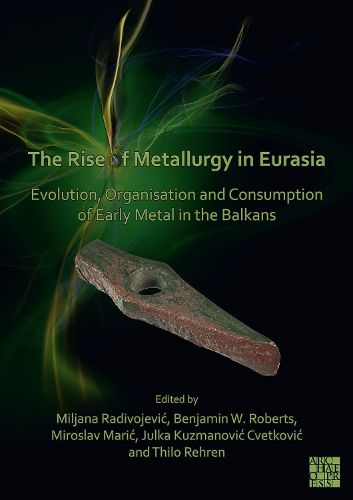Readings Newsletter
Become a Readings Member to make your shopping experience even easier.
Sign in or sign up for free!
You’re not far away from qualifying for FREE standard shipping within Australia
You’ve qualified for FREE standard shipping within Australia
The cart is loading…






The Rise of Metallurgy in Eurasia is a landmark study in the origins of metallurgy. The project aimed to trace the invention and innovation of metallurgy in the Balkans. It combined targeted excavations and surveys with extensive scientific analyses at two Neolithic-Chalcolithic copper production and consumption sites, Belovode and Plocnik, in Serbia. At Belovode, the project revealed chronologically and contextually secure evidence for copper smelting in the 49th century BC. This confirms the earlier interpretation of c. 7000-year-old metallurgy at the site, making it the earliest record of fully developed metallurgical activity in the world. However, far from being a rare and elite practice, metallurgy at both Belovode and Plocnik is demonstrated to have been a common and communal craft activity.
This monograph reviews the pre-existing scholarship on early metallurgy in the Balkans. It subsequently presents detailed results from the excavations, surveys and scientific analyses conducted at Belovode and Plocnik. These are followed by new and up-to-date regional syntheses by leading specialists on the Neolithic-Chalcolithic material culture, technologies, settlement and subsistence practices in the Central Balkans. Finally, the monograph places the project results in the context of major debates surrounding early metallurgy in Eurasia before proposing a new agenda for global early metallurgy studies.
$9.00 standard shipping within Australia
FREE standard shipping within Australia for orders over $100.00
Express & International shipping calculated at checkout
The Rise of Metallurgy in Eurasia is a landmark study in the origins of metallurgy. The project aimed to trace the invention and innovation of metallurgy in the Balkans. It combined targeted excavations and surveys with extensive scientific analyses at two Neolithic-Chalcolithic copper production and consumption sites, Belovode and Plocnik, in Serbia. At Belovode, the project revealed chronologically and contextually secure evidence for copper smelting in the 49th century BC. This confirms the earlier interpretation of c. 7000-year-old metallurgy at the site, making it the earliest record of fully developed metallurgical activity in the world. However, far from being a rare and elite practice, metallurgy at both Belovode and Plocnik is demonstrated to have been a common and communal craft activity.
This monograph reviews the pre-existing scholarship on early metallurgy in the Balkans. It subsequently presents detailed results from the excavations, surveys and scientific analyses conducted at Belovode and Plocnik. These are followed by new and up-to-date regional syntheses by leading specialists on the Neolithic-Chalcolithic material culture, technologies, settlement and subsistence practices in the Central Balkans. Finally, the monograph places the project results in the context of major debates surrounding early metallurgy in Eurasia before proposing a new agenda for global early metallurgy studies.